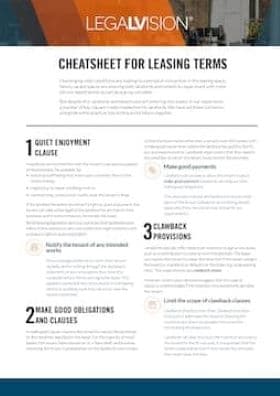In Short
- Landlords must take reasonable steps to reduce the risks of injury or property damage from extreme weather.
- Commercial leases should clearly set out responsibilities for repairs, insurance and damage.
- Seek legal advice to ensure your lease terms address location-specific weather risks.
Tips for Businesses
Extreme weather events can expose landlords to legal and financial risk. Review your commercial lease to ensure it includes clear terms for repairs, insurance and property damage. A well-drafted lease can help you avoid disputes and manage future risks more effectively. Speak to a leasing lawyer for tailored advice.
With climate change, extreme weather events are expected to become more frequent and harsh in Australia. From bushfires and floods to cyclones and heatwaves, these events can present significant challenges for landlords and tenants who are unprepared. To protect yourself as a landlord, it is essential to understand your rights and responsibilities under commercial leases before these events occur. If an extreme weather event affects or damages your rental property, you should seek legal advice to determine the best course of action.
This article outlines how landlords can protect themselves by exploring the legal and practical considerations to take before, during and after an extreme weather event.

This cheat sheet explains the key clauses you need to be aware of as a landlord in a lease agreement.
Duty of Care
As a landlord, you have a duty of care towards your tenant regarding the condition of the property at the start of the tenancy. This means you must take reasonable steps to prevent any foreseeable risks of injury to the tenant, including:
- the obligation to inspect the property to identify any potential risks before the tenant moves in; and
- the responsibility to fix any defects found, or that should have been found, during a reasonable inspection.
For extreme weather events, this duty of care means that, as a landlord, you should:
- carry out regular, thorough inspections of the property, focusing particularly on vulnerable areas or structural issues; and
- hire qualified professionals (e.g., building inspectors) to assess and advise on potential risks.
Failure to meet this duty of care can lead to legal liability.
The Importance of the Lease Agreement
Commercial leases define the relationship between the landlord and the tenant for commercial businesses and properties. In other words, the lease agreement primarily sets out their rights and responsibilities.
Now, let us look at the clauses in a lease that are relevant to your situation in the event of an extreme weather event.
Repair and Maintenance
This clause outlines who is responsible for maintaining and repairing different parts of the premises. These responsibilities are usually negotiated between the landlord and tenant. Once negotiations are complete, it is essential that the lease agreement clearly defines the repair and maintenance obligations for both parties.
Given the increasing frequency and severity of extreme weather events, it is vital to speak to a leasing lawyer to discuss how commercial leases can specifically address the risks of extreme weather relevant to your property’s location.
Insurance
This clause outlines the insurance responsibilities of both parties. The lease is designed to protect each party’s interests and reduce risks related to property damage, liability, and business interruptions.
In the case of an extreme weather event, you may want to:
- require tenants to maintain business interruption insurance;
- ensure your building insurance covers extreme weather events relevant to your location; and
- regularly review and update insurance policies to account for changing climate risks.
Force Majeure
These provisions cover unexpected situations that prevent parties from meeting their contractual obligations.
A well-drafted force majeure clause clearly defines the events that qualify, which may include specific extreme weather events relevant to the property’s location. It also outlines the consequences of such events, which may include rent deductions or lease termination options. These clauses are essential for managing risk and provide a framework for handling unforeseen events that could have a significant impact on the lease agreement.
Damage and Destruction
These provisions in commercial leases outline the rights and responsibilities of both the landlord and tenant in the event of damage to the leased property, covering repair obligations, rent deductions, and termination rights.
Statutory Compliance
While commercial leases are primarily contractual, certain legal obligations may still be applicable. For example, you should be aware of any state-specific retail laws that could affect your rights and responsibilities under the lease, comply with building codes and safety regulations, which can outline your repair duties and follow work health and safety laws, which may require you to ensure the premises are safe during extreme weather events.
Continue reading this article below the formKey Takeaways
Extreme weather events are likely to become more severe and frequent in the near future, so landlords should take proactive steps when drafting lease agreements. A well-prepared landlord will ensure the lease clearly defines each party’s rights and responsibilities during such events, especially in relation to maintenance, repairs, and how to respond when extreme weather occurs. Because lease clauses can be complex, landlords should seek advice from a leasing lawyer to draft or review the terms and avoid future disputes caused by unclear or poorly written provisions. Landlords should also understand that some statutory obligations may override the terms set out in the lease.
If you need help in ensuring that you have a well-drafted lease agreement, our experienced leasing lawyers can assist as part of our LegalVision membership. For a low monthly fee, you will have unlimited access to lawyers to answer your questions and draft and review your documents. Call us today on 1300 544 755 or visit our membership page.
Frequently Asked Questions
Landlords must take reasonable steps to ensure the premises are safe, including inspecting for risks and fixing defects. If an extreme weather event causes damage, landlords may be liable if they failed to meet their duty of care or maintain the property as required by the lease.
Commercial leases can include clauses covering repairs, insurance, force majeure, and damage. These help clarify each party’s obligations and reduce disputes if weather-related damage occurs. LegalVision recommends reviewing these clauses with a lawyer to ensure they reflect current climate risks.
We appreciate your feedback – your submission has been successfully received.












